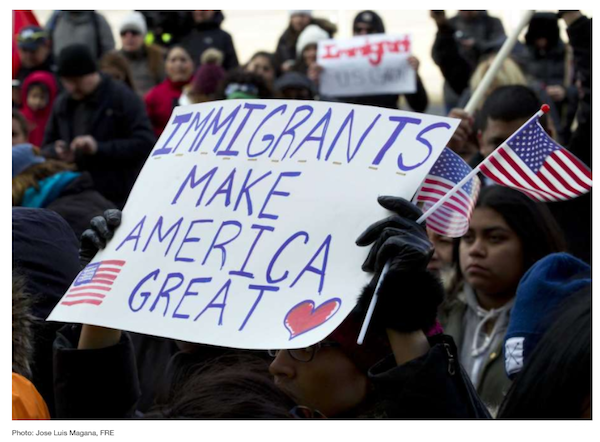 President Trump's hastily arranged ban on foreigners traveling to the United States from select countries sparked protests, invited a court fight, and helped make the case for large-scale immigration reform - even if that last result was not a consequence he intended.
President Trump's hastily arranged ban on foreigners traveling to the United States from select countries sparked protests, invited a court fight, and helped make the case for large-scale immigration reform - even if that last result was not a consequence he intended.
During the campaign and in defending his most recent immigration actions, Trump repeatedly has made the argument that we need to know who is here and what their intentions are toward the United States. On that, he could not be more correct.
But instead of governing in precisely the way that Republicans for years criticized President Obama - issuing executive orders only to have them quickly and aggressively challenged in federal court - President Trump could seize the moment of a unified GOP government in Washington and work with leaders in his own party to enact a meaningful and lasting solution. Without giving anyone a free pass, the time is right to identify and tax those who are now living in the shadows.
Most undocumented people are frightened about the future, particularly following the results of the last election and the initial actions of our new president. They live in constant anxiety about their families being torn apart.
I share their worry, but another of my fears is we now have a huge group of people in this country who would not report it if they witnessed someone planning an act of terror. At the very least, many would be hesitant to call law enforcement knowing they could suddenly be caught up in deportation proceedings. If someone really wanted to do harm to our nation, it would be easy for them to blend into any number of immigrant communities with the knowledge they would likely not be detected.
Instead of deporting undocumented workers or offering what some derisively call "amnesty," the process can start by giving a legal status to those willing to consent to a background check and pay taxes on their wages. They would be issued a tamper-proof ID like a Texas driver's license. We have the technology to better ensure those who enter this country to earn a living are really here for that purpose.
Once registered, they need to be required to work for a business that deducts and matches taxes. The degradation of the employer-employee relationship means that, right now, no one is taking responsibility for taxes or accident insurance. The days of Harris County taxpayers picking up the tab when these hard-working people are dropped off at Ben Taub and our other public hospitals needs to fade into history.
Identifying and taxing the workers accomplishes two important things: Billions in tax revenue coupled with improved national security, giving President Trump and the American people peace of mind that only those authorized to work in this nation are in our midst.
Meantime, Congress could immediately pass the Bridge Act, a bipartisan effort aimed at maintaining the protections offered to young immigrants by former President Obama's Deferred Action for Childhood Arrivals. More than 740,000 young people were granted reprieves from deportation and work permits under this program, but could lose out if President Trump ever follows through with his campaign promise to end DACA.
This would be a good start. But at some point in the near future, Congress needs to pass a comprehensive immigration and border security bill.

